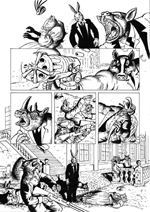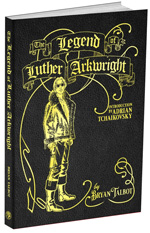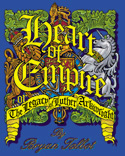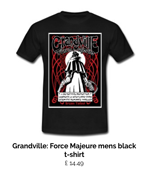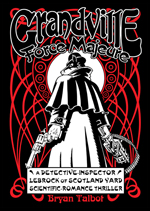An interview with Benjamin Berton
1. So Napoleon has won the war and “we”, French, rule Europe. That’s a strange idea for a British citizen?
Bryan: No stranger than animal-headed people! I think people are quite open minded when it comes to fiction and are interested in worlds whose history has taken a different path.
2. I’d thought the reception would be colder than this in your own country because of this “original sin of thought”. Grandville seems on the contrary to have been quite a mainstream success. How do you explain that?
Bryan: Readers find the story gripping, which is what I intended when I wrote it. A good story pulls people in. The protagonist, Detective Inspector LeBrock, is British so perhaps the readers associate with him being the outsider going on an adventure in an exotic city.
3. Britain is an anarchist and socialist country now? The Monarchy is no more. Shocking, isn’t it? Were the Sex Pistols right before their say? Can you tell us exactly what happened in Talbot’s World ?
Bryan: In the world of the story Napoleon conquered all of Europe and Russia and had their royal families executed. Grandville is set two hundred years later, twenty-three years after Britain was granted independence after a prolonged campaign of civil disobedience and a terrorist campaign by the British Resistance. I develop this idea more in the second book.
4. How did you come with this dystopian idea? What got you interested in Napoleon and those 1800s first ?
Bryan: The original inspiration for the story came from the French illustrator Jean Ignace Isadore Gérard, who used the pen-name JJ Grandville. His anthropomorphic animal drawings and his pseudonym came together to suggest to me a steampunk Paris, a “grand ville’, populated by animals. I knew that it had to be the centre of a vast French Empire and Napoleon seemed the ideal way to suggest how this had come to pass.
5. What, according to you, makes this period (the beginning and heart of industrial and technological revolution) particularly interesting? Historically? Politically? Graphically?
Bryan: I deliberately moved the time period from the early nineteenth century of Gérard to an imaginary Belle Epoch as I thought it would be more visually interesting – Art Nouveau, the fashions, steam powered machines etc. It was also the time of the anarchists, which I wanted to refer to.
6. Were you familiar with the graphical environment of that time?
Bryan: Yes. I already had several books on Art Nouveau and the impressionists and a few books of late nineteenth century French illustrations and advertising art.
7. How is it you know France so well ?
Bryan: I’ve always enjoyed being in France and have visited it many times. I often go to the Angouleme festival and usually stop in Paris for a few days afterwards.
8. Grandville is a very violent book. A tough steampunk story with shotguns, murders, sex (badger sex!) and a very dark atmosphere. Paradoxically, animal-like characters make it tougher, whereas they generally try to milder things in the comics world. How is it you’re getting so wild after One Bad Rat and Alice in Sunderland? Symbolically, Snowy has become an opium addict !
Bryan: After working for about five years on Alice, a quite academic book, I just wanted to have fun. I’d been wanting to do a detective thriller for some while, so when I got the idea for the setting for Grandville, I immediately knew that I wanted it to be in this genre. Actually, a lot of readers have commented on the Snowy character and seem to have been quite moved by that scene! Not bad, seeing as it only lasts a page and a half. And, if you like the idea of Badger sex, just wait till you meet Billie in the next book! She’s hot!
9. I’ve read you had this book of French illustrator Jean Ignace Isidore Gérard for a few years. What is the connexion with Tenniel which had made you buy it ?
Bryan: Tenniel was very influenced by Gérard. To show you how much, I’ll paste two pictures here – one by him and the famous Alice illustration of the Griffin and the Mock Turtle.
10. It seems to me you hold a lot in reserve from this first book ? It is highly referential of course but the book is deliberately extrafast-paced and concentrates on action. It looks as if you had avoided to be too literate or clever on it. Was it a personal choice to make it an action book first ?
Bryan: Yes. I wanted to create a real page-turner (do you have that phrase in French?). A really exciting read. Several people have told me that they had to read it fast the first time, carried along by the story, then read it through another few times slowly, so they could take in all the details of the illustrations. I think any cleverness in the book is in the structure and the storytelling.
11. At a certain point (and that’s my only critical point about the book), we are curious to learn more about Grandville and the world you’ve created, but you decide to stick to the plot and don’t give as much as we’d like to discover it. Is it a way to make us wait until book 2 ?
Bryan: Not at all. When I wrote it, it was just an idea for a one-off story but I had so much fun working on it that when I finished I immediately wrote another! You’ll learn more about it as the stories progress.
12. With the world you’ve created and the things you probably haven’t shown yet, it seems to me you could get along with Grandville stories for a thousand years. How many stories have you planned for now ?
Bryan: If these first two do well, I’ve definite ideas for a further three and possibly two more.
13. Can you tell us more about book 2 which is out in Britain in a few weeks (months) from now ?
Bryan: Grandville Mon Amour is out late 2010. It’s all pencilled and lettered and I’ve nearly inked about half of it. It’s set three weeks after the end of the first book and it sees LeBrock pitted against a psychotic serial killer, an old adversary and deadly urban guerrilla fighter, the most sadistic member of a fanatic wing of the British resistance movement during the occupation. If Grandville was Tarantinoesque, Grandville Mon Amour is more Hitchcockian.
14. Why isn’t Le Brock a rat ? I’d thought you had a special relationship with rats since One Bad Rat ? Heard it was originally one before it turned into a badger.
Bryan: You’re right. My first instinct was to make the protagonist a rat but I realised within a few days that a badger would be much better. Not only do they look more visually striking, with the black stripes on white almost looking as if they are wearing a mask, but they are extremely tenacious and ferocious creatures, characteristics that I wanted the hero to have. The rat became his sidekick, Detective Roderick Ratzi, the Watson to his Holmes.
15. Without saying too much about the plot, let’s say conspiracy theories are not well seen in France since 9/11/2001, and people pretending the whole stuff was planned by the American secret services and whatever lobby you can imagine. What would say to people who would reproach you for adding your word to the overheard chorus : “Everybody corrupted. Everybody rotten” ? I’ve got a friend who read Grandville and said it was a revisionist fable about the World Trade Center disaster!
Bryan: All storytellers use shared cultural experiences in their stories. It’s a way of bringing a whole atmosphere into a story in a very simple and direct way. By paralleling the attacks on 9/11 I immediately tap into strong feelings that we mutally share, something that resonates and adds depth. As for the conspiracy theories, I’m using them here as part of the plot. But the story is not about 9/11, it’s not even set in our world. It’s obviously a work of imaginative fiction. It’s even sub-titled “A fantasy” in case anybody didn’t realise that what we’re doing here is playing “let’s pretend”. It’s first and foremost a detective-thriller. The important message that IS represented in the story though is hard fact – that the British and American people WERE lied to by their leaders about Iraq having weapons of mass destruction and that the war was a complete connerie.
16. Grandville comes two years after what is maybe you’re most personal work of art. The Sunderland Alice Biography. It hasn’t been translated yet in France. Will it ever be ?
Bryan: I’ve no idea. Perhaps it’s too English for the French. But it was published in Italy to a good reception. It comes out in Spain next month. It won a couple of awards in Greece too, so perhaps it’s not too English for other countries’ tastes.
17. Alice in Sunderland talks about a place (Sunderland where you live for 10 years now) in a way it never has been done by comics before. Moore had done something about Northampton but not of this density into a comic book. It must have been an amazing amount of work to do. How is it you came with this method and seem to stick to it through the years ? You work as an historian as much as a writer, don’t you ?
Bryan: If I’d known it was going to take as long as it did, I would never have started it. It was the hardest book I’ve ever done and it required a massive amount of historical and other research. The structure alone took me about six months before I started to script it. All the complex information had to be presented in an order which made it easy to digest. At the time I was working on it I was complaining that it was like doing a Phd. And I didn’t mean that lightly - my wife and several friends have done Phds and I know what’s involved. The irony is that I was actually presented with an Honorary Doctorate in Arts last year for my work on it by Sunderland University, so it really WAS like doing a phd!
18. Do you recognise the “psychogeography” term which is used (more or less) to describe the study of effects a place, town or special land has on its inhabitants? It is a French concept introduced by the Situationists at the end of the 1960s that French writers or scientists have deserted since then and which, for example, is promoted by anglo-saxons writers like Will Self.
Bryan: I didn’t know that it had its origins in France but, yes, I was aware that it was a piece of psychogeography. I’d long since reads the work of Peter Ackroyd, its foremost English proponent.
19. How do you consider your Alice work from now ? It is incredibly packed with details, faits divers and stories. As far as I am concerned, I still get hypnotized and fascinated by the general movement of the narration, though I recognize sometimes it to be a bit hard to swallow for a simple comic book reader. Are you specially proud of that one ?
Bryan: Absolutely. I’m extremely proud of its structure. On the surface it seems almost stream-of-consciousness but underneath is a rock-solid framework. I’m also proud of the huge amount of positive feedback I’ve had from readers from all over the world. The UK edition is nearly into its fifth printing and the USA edition is now going to its second.
20. In many of your works, there is a special connection to childhood and being a young person (Beatrix Potter, Lewis Carroll, Grandville,..) ? Is it because comics are related for you to your childhood or because youth is the matrix of almost all serious art ?
Bryan: I think that’s true for me with Alice and Grandville. I can’t remember a time when I didn’t know John Tenniel’s Alice illustrations. Grandville is like me reworking the comics of my youth. Like France, there’s a strong anthropomorphic tradition in British children’s comics. I was especially fond of the Rupert the Bear annuals by Alfred E Bestall. In Grandville, the murder near the beginning is in Rupert’s village, Nutwood. In fact, you can see Rupert’s father in the background in some panels. I write about this in the afterword – which is exclusive to the French edition by Bragelonne/Milady. I never read Beatrix Potter when young, though. I’m from a working class family and Potter is very middle class. I had to research her for The Tale of One Bad Rat.
21. The second connection maybe and we see it getting more and more important and complex in your work is the relation to literature. Alice in Sunderland is very rich in that sense with its complex narrative. I know you wife is into linguistics. Have you got yourself fallen into the study of how text is organized, of how the medium works? I can remember you mentioned Scott Mc Cloud in Alice. Do you think it is part of the job to think about the way it works ?
Bryan: Yes, I consider it a lot; all the time I’m writing, laying out and drawing a comic. It’s a visual medium so the words have to be chosen to carry maximum information. And I spend a lot of time working out the visual storytelling – composing both the individual pages and the facing pages to work as a whole, the compositional flow leading from one panel to the next, the placement of the eye level, the encapsulating of atmospheres between two facing pages, “hiding” things behind the right hand page so you have to turn the page to see the surprise and so forth.
22. It’s been a long time now you’ve left the classical “superhero” type of narration. In fact, as far as I remember, you hardly never was into that, even when in DC (Batman maybe?, Sandman certainly not, a bit of Fables). Do you consider yourself as a totally independent comic writer or could you contemplate to come back into the world of Big Twos in the future? Would you be interested?
Bryan: No. I much prefer writing and drawing my own stories.
23. As an artist, it seems to me you quite early got a very interesting position of independence and autonomy, whereas most of your English contemporaries had to work for DC or Marvel to survive. Is it me or did you work hard to get this early free position that hard? I got the impression you mostly live like a European independent artist nowadays with very few editorial constraints. Am I right?
Bryan: You’re absolutely right. It also means that I own the rights to the books I work on. I realised that this was the way to go after going to my first Italian and French comic festivals when I discovered the world of BD albums nearly thirty years ago and met creators such as Moebius, Hugo Pratt and Milo Manara. But, even before that, I was doing my own thing. After all, I started off in the independent British underground comics of the seventies.
24. You’ve pushed the genre further those years with stuffs like the Naked Artist (in prose) and Metronome which is, on the contrary, worldless. Is experimentation part of the job? Have you got other projects of the sort?
Bryan: Yes, there’s one or two that I might get around to doing. I always experiment. I think that the biggest difference with me now is that with The Adventures of Luther Arkwright, my first graphic novel, started over thirty years ago, the experimentation was obvious and in your face, requiring a high level of comics literacy to read it, now it’s (I hope) all beneath the surface. To be successful the reader shouldn’t be aware of it. Metronome was different – it was an experiment with form, which was obviously noticeable.
25. I’ve got the impression, from France, Heart of Empire didn’t have the same impact and the same critical acclaim Luther Arkwright had received 20 years before, though it must have been very important to you to come back with those issues at the turn of the century. Is that just an impression? How would you rate Heart of Empire ten years from now?
Bryan: I wasn’t interested in doing another story just like Arkwright, even though it was a sequel. It did get some good reviews from people like Warren Ellis and was nominated for several awards, winning an Eagle. I’m still very proud of it.
26. Is still there a chance Luther got adapted into a movie? There was something on the way a few years ago. How is it going?
Bryan: That’s still going on. Films move at a glacial pace. I’ll believe it when I’m sitting in the cinema watching it. There’s also interest in a Grandville movie.
27. As a young man, you contemplated a career into movies, I guess. Have you given up your ambitions? Neil Gaiman put a toe (more than that probably) in the industry as a writer than with Coraline. Is it something you’ve discussed with him and you would like to try in the future?
Bryan: No. The world of movies seems to be inhabited by people who talk bullshit for a living. I never contemplated working in movies, I just made 8mm films for fun.
28. To me the notion of “multiverse” you’ve helped to introduce in the comics world at the end of the 1970s is in literature (not only in sci-fi and anticipation) one of the 2 or 3 important narrative inventions of the past century. It’s been so influential for other arts that it can be ignored. I consider you, Michael Moorcock (into novels) and Alan Moore to have pioneered the notion for followers. Do you share my view or is it just historical reconstruction?
Bryan: Parallel world stories had been around for decades in pulp SF story magazines and novels, such as those by H.Beam Piper but, you’re right, it was Michael Moorcock who was the most seminal writer of the genre of the 60s and 70s and who influenced both myself and Alan.
29. Can you tell us about the way you see the place of drawing in your art? Your drawing did change drastically through the years from Alice and its digital sources to Bad Rat which was mostly painted art. Is that just an instrument you transform to serve the writing (a subordinate tool ?) or by essence a metamorphic kind of power due to change to… survive ?
Bryan: The Tale of One Bad Rat was the first non-genre graphic novel that I did, when such a thing was relatively rare, back in 1994. I realised then that I had to be very deliberate in the style that I chose to tell the story in: it had to be very accessible to non-comic readers – people who didn’t have an acquired knowledge of comic grammar. I chose the clear line style as it’s a very straightforward unfussy way of presenting an image, giving an accessible, clear picture
30. Can you tell us an anecdote about the way it was being a sci-fi and comics writer round 1976-77? I’ve got an idealistic vision of that time. All those great artists knowing each other in London, creating from the same stuff, sharing ideas. It must have been a very exciting period in England….
Bryan: It probably was – in London! Then I was an unemployed twenty-four year old living in the northwest. I only began to meet authors and comic creators later. Sorry to disappoint you!
This interview is available in the original French at the Flucuat.net site: many thanks to Benjamin for taking the time to sort out the English version!

